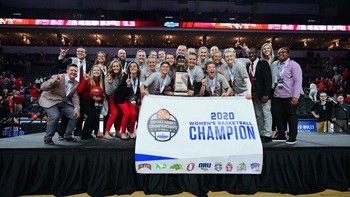Undergraduate Research Studies Human Impact on Missouri River
The 59-mile stretch of river that runs just south of the University of South Dakota and city of Vermillion is federally designated as the Missouri National Recreational River. This free-flowing section of one of the longest rivers in the world is home to a variety of plant and animal species and serves as a popular location for anglers and boaters. The un-channelized and undammed part of the “Mighty Mo” also represents an ideal spot for researchers to examine the impact of invasive activities on the river.
Funded through the NSF’s Research Experience for Undergraduates program, the Sustainable Remediating InVasives to Encourage Resilience (RIVER) project will bring 10 undergraduate students annually to USD to perform research under the direction of a faculty member. Principal investigator Meghann Jarchow, Ph.D., said invasive elements range from non-native tree and fish species to agrochemical contamination of the river.
“Since numerous factors affect the river, it makes sense to approach efforts to maintain its sustainability from a multidisciplinary perspective,” said Jarchow, who is also an assistant professor of biology and coordinator of the sustainability program at USD. “This program has an explicit focus on training interdisciplinary scientists. Increasingly, scientists will have to be good at working in teams with people from different disciplines and be more comfortable with issues related to diversity and inclusive excellence.”
Beginning next fall, undergraduate students will apply to the program. Those chosen will spend 10 weeks of summer 2017 working on individual research projects with faculty who are members of USD’s Missouri River Institute. The institute develops and promotes research, education and public awareness of the natural and cultural resources of the Missouri River Basin.
Students will also travel as a group to various locations on the river and collaborate on a final project, which will both disseminate their individual and collective research and make recommendations to the public on river management issues.
Jarchow said she plans to recruit students who bring unique cultural and life experiences to the place-based nature of this project. She is collaborating with two tribal colleges located along the Missouri River -- the Nebraska Indian Community College and the Nueta, Hidatsa and Sahnish College -- to gain participation by Native American students in the region. She also aims to recruit sustainability majors from colleges and universities across the country.
Research projects will range from studying the effects of invasive tree and fish species on Missouri River food webs to the ethno-historical relationship among American Indian tribes and the Missouri River ecosystem. USD faculty from anthropology, biology, Earth science and sustainability will serve as mentors.
“My goal is to model a process where students gain depth of knowledge in their individual topics but also integrate with other people to get a better sense of the broader system,” Jarchow said. “If we are training future scientists, we need to train them beyond just how to do the scientific method.”


